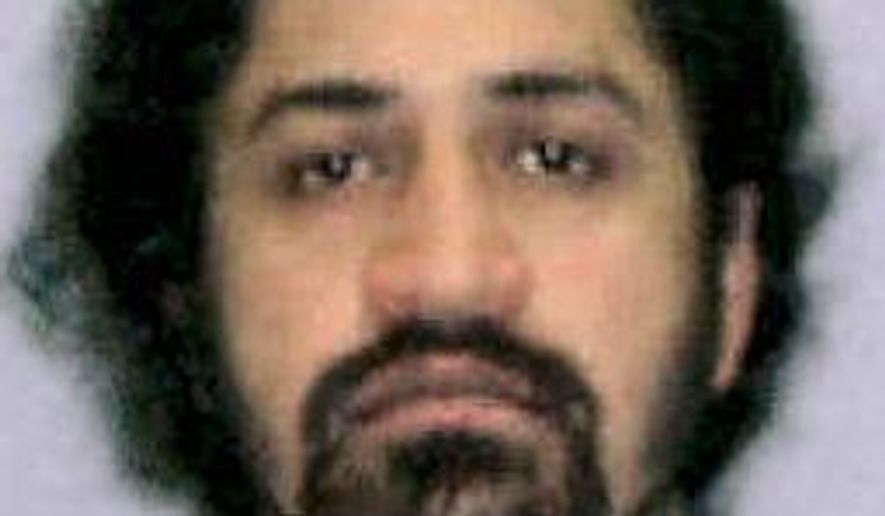Iyman Faris is set to be released from prison in 2020 after serving 17 years behind bars for terrorism-related charges stemming from a plot to destroy the Brooklyn Bridge. By the time he gets out, American authorities hope, he will no longer be able to call the U.S. his home.
The Justice Department has filed a lawsuit to try to strip the Pakistan-born Faris of his citizenship, which he obtained in 1999, saying it’s an affront to allow him to continue to be an American citizen.
It’s just the type of case authorities say they expect to pursue more frequently under President Trump and Attorney General Jeff Sessions.
“The attorney general and the administration are focused on enforcing all immigration laws, especially when it comes to this pinnacle level of citizenship,” said one Justice Department official, who spoke on the condition of anonymity.
Native-born citizens cannot have their citizenship revoked, but those who became naturalized can lose citizenship, and all the rights that come with it, if they are found to have unlawfully or fraudulently obtained naturalization.
The Justice Department can seek to strip a person of citizenship either through a criminal case, by obtaining a conviction of naturalization fraud, or by filing a civil suit claiming the person procured naturalization illegally or procured it by through willful misrepresentation during the naturalization process.
Faris pleaded guilty to providing material support and resources to al Qaeda in 2003. He admitted he researched methods to sever cables on the Brooklyn Bridge and had met with Osama bin Laden at an al Qaeda training camp in Afghanistan.
Authorities sought to revoke his citizenship on grounds that he entered the U.S. using another person’s passport, willfully misrepresented the circumstances under which he came to the United States, and cited his support for al Qaeda as evidence he was engaged in terrorist activities that would have made him ineligible for admission to the U.S. had those facts been known at the time.
“We are doing our best to hold these people accountable,” the department official said. “When these people get through, it weakens the integrity of citizenship.”
The Justice Department stepped up the number of criminal charges brought in an effort to revoke citizenship in fiscal 2017, with 57 cases filed compared with 46 cases in fiscal 2016 and 44 cases in 2015.
At least another 25 civil denaturalization cases were also filed by the Civil Division’s Office of Immigration Litigation in 2017, according to an estimate provided by another Justice Department official.
Among those who had their citizenship stripped last year was Araceli Martinez, who was convicted of impersonating a U.S. immigration officer. She lied about the crime when she applied for citizenship. In November, the Justice Department filed denaturalization cases against five people who lied about a history of sexual abuse of minors during the citizenship process.
Officials said civil denaturalization cases are pursued by the same office that handles other immigration cases — which is seeing plenty of work under the Trump administration. Despite the competing time pressures, officials said, they are getting encouragement to bring the denaturalization cases.
Three more civil cases came in September after the Department of Homeland Security discovered it had mistakenly granted citizenship to more than 800 immigrants who had been ordered deported.
The investigation, dubbed Operation Janus, identified approximately 315,000 cases in which some fingerprint data for immigrants with final deportation orders was missing from a digital fingerprint repository used for background checks.
Among the three denaturalization cases already filed as a result of the Homeland Security review is one against 44-year-old Rashid Mahmood, who entered the country in 1992 using a different spelling of his last name and a counterfeit of a temporary resident card that had been assigned to a Liberian woman. He was ordered deported for the fraud but absconded.
In 1997, after Mr. Mahmood had married a U.S. citizen who filed a visa petition on his behalf, he used the current spelling of his name to apply to register for permanent residence in the U.S. He claimed to have “entered the U.S. with [his] own passport but without a visa,” according to court documents filed in his denaturalization case.
Prosecutors say Mr. Mahmood lied during his naturalization interview when he said he had never been ordered removed and when he said he never provided misleading information.
“Mahmood was required to establish that he was a person of good moral character during the period beginning five years prior to the filing of his application for naturalization and continuing until the time of admission to citizenship,” states the complaint filed in his case. “Because Mahmood provided false testimony to obtain an immigration benefit during the statutory period, he was not eligible for naturalization; accordingly, he illegally procured his naturalization.”
A senior Justice Department official said as the Department of Homeland Security continues its investigation and digitizes the paper fingerprint records, prosecutors expect to receive more affidavits that could support civil denaturalization cases.
But beyond cases identified as part of the ongoing Homeland Security Department review, Justice Department officials said the Office of Immigration Litigation is prioritizing denaturalization cases involving individuals found to have terrorism connections, or individuals with criminal backgrounds such as sex or child abusers or human rights abusers.
“These people typically don’t stop their criminal activity after they get their passport,” the Justice Department official said. “It’s a fairly common scenario we see where a person is engaged in serious criminal activity before naturalization, and they continue to do so after.”
• Andrea Noble can be reached at anoble@washingtontimes.com.




Please read our comment policy before commenting.